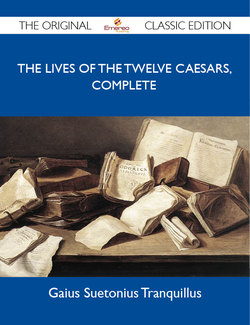The Lives of the Twelve Caesars, Complete - The Original Classic Edition

Реклама. ООО «ЛитРес», ИНН: 7719571260.
Оглавление
Tranquillus Gaius. The Lives of the Twelve Caesars, Complete - The Original Classic Edition
Отрывок из книги
THE LIVES OF THE TWELVE CAESARS By C. Suetonius Tranquillus;
To which are added,
.....
that, instead of rousing, he seems to have precluded, the efforts of any future historian. Yet, with respect to this work, we have more reason to admire him than others; for they only know how well and correctly he has written, but we know, likewise, how easily and quickly he did it." Pollio Asinius thinks that they were not drawn up with much care, or with a due regard to truth; for he insinuates that Caesar was too hasty of belief in regard to what was performed by others under his orders; and that, he has not given a very faithful account of his own acts, either by design, or through defect of memory; expressing at the same time an opinion that Caesar intended a new and more correct edition. He has left behind him likewise two books on Analogy, with the same number under the title of Anti-Cato, and a poem entitled The Itinerary. Of these books, he composed the first two in his passage over the Alps, as he was returning to the army after making his circuit in Hither-Gaul; the second work about the time of the battle of Munda; and the last during the four-and-twenty days he employed in his journey from Rome to Farther-Spain. There are extant some letters of his to the senate, written in a manner never practised by any before him; for they are distinguished into pages in the form of a memorandum book whereas the consuls and commanders till then, used constantly in their letters to continue the line quite across the sheet, without any folding or distinction of pages. There are extant likewise some letters from him to Cicero, and others to his friends, concerning his domestic affairs; in which, if there was occasion for secrecy, he wrote in cyphers; that is, he used the alphabet in such a manner, that not a single word could be made out. The way to decipher those epistles was to substitute the fourth for the first
letter, as d for a, and so for the other letters respectively. Some things likewise pass under his name, said to have been written by him when a boy, or a very young man; as the Encomium of Hercules, a tragedy entitled Oedipus, and a collection of Apophthegms; all which Augustus forbad to be published, in a short and plain letter to Pompeius Macer, who was employed by him in the arrangement of his libraries.
.....